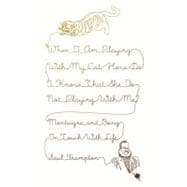
| Preface | p. 1 |
| Waking to the Sound of a Spinet | p. 13 |
| Because It Was Him, Because It Was Me | p. 25 |
| To Jump or Duck at the Bang of an Arquebus | p. 41 |
| To Philosophize Is to Learn to Die | p. 65 |
| Que sçais-je? - What Do I Know? | p. 81 |
| When I Am Playing with My Cat, How Do I Know She Is Not Playing with Me? | p. 97 |
| To Rub and Polish Our Brains with Others | p. 123 |
| The Philosopher's Stone | p. 155 |
| The Exercises of Venus | p. 173 |
| The Touch of a Familiar Hand | p. 193 |
| A Dog, a Horse, a Book, a Glass | p. 219 |
| Of Experience | p. 245 |
| Select Bibliography | p. 279 |
| Illustrations | p. 287 |
| Index | p. 291 |
| Table of Contents provided by Ingram. All Rights Reserved. |
The New copy of this book will include any supplemental materials advertised. Please check the title of the book to determine if it should include any access cards, study guides, lab manuals, CDs, etc.
The Used, Rental and eBook copies of this book are not guaranteed to include any supplemental materials. Typically, only the book itself is included. This is true even if the title states it includes any access cards, study guides, lab manuals, CDs, etc.